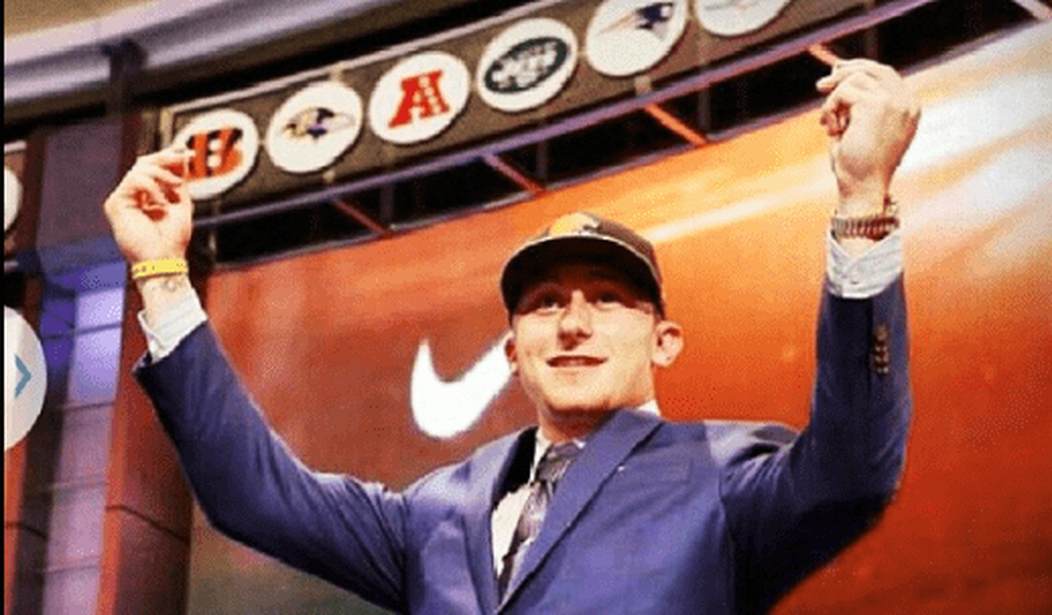Cleveland quarterback Johnny Manziel is awaiting news that will determine his future in the NFL. He has repeatedly run into trouble, despite an outstanding college career, winning the Heisman trophy and becoming the Browns’ first round draft pick and the number 22 pick overall. His questionable decisions have marked his football career as far back as his college days playing at Texas A&M, and now, his job is on the line.
Before the start of the 2013 football season, Johnny Manziel was given a half-game suspension for the “inadvertent” participation in the selling of his autograph, a violation of NCAA bylaws. Earlier that summer the quarterback was asked to leave the Manning Passing Academy for skipping a session. Manziel said that he was ill and his cell phone had died causing him to oversleep. He did not deny consuming alcohol the night before. “I’m still a sophomore in college,” he said. “I’m still going to do things that everybody in college does, and I’m going to continue to enjoy my life.”
The drama continued as he took his place on the Browns’ roster. Manziel entered rehab at the end of the 2014 NFL season. Police were involved, just seven months later, after an argument with his girlfriend escalated and a witness called for help. Manziel admitted to drinking before driving that night, but because he was under the legal limit, no charges were filed.
A video surfaced this past December of an inebriated Manziel drinking and rapping with his friends. Then in January, he appears to have visited a Planet Hollywood in Las Vegas “wearing a blonde wig, a fake mustache, glasses, and a hoodie… and going by the alias of ‘Billy’.” He was reportedly drinking and gambling, but no clear evidence proved Manziel was the person spotted that night. He did, however, fail to show up to meet with team doctors in Cleveland the next morning, suggesting that he was indeed in Vegas.
Johnny Manziel is an interesting case study for parents and young athletes today. His poor decision-making and the reputation he has created for himself provide many warnings for aspiring athletes. Character matters, and winning a Heisman trophy and getting drafted into the NFL are no guarantees that your career will be successful.
Here are 5 lessons we can learn from Johnny Manziel’s mistakes:
1. Partying will catch up to you.
Very little goes unnoticed in today’s age of social media and smartphones. Manziel’s scandals usually involve alcohol, despite his attempt at rehab. His example reminds us that drinking can inhibit your ability to make wise decisions. Lowered inhibitions, party atmospheres AND cameras can lead to trouble for any athlete.
2. Skills without character make you a liability.
Who wants to fight for a player that continually jeopardizes the integrity of his team? Despite a 2015 season that showed improvement from Johnny Manziel, he watched many games from the bench. The sidelining was often a direct result of his off-field shenanigans. Just because he was a talented athlete did not guarantee he’d get playing time. His lack of character made him a danger for his entire organization.
3. PR moves do not always save the day.
Going to rehab was a smart move. Manziel did something substantial to help himself, however it fell short. Rehab was a nice story to show he was trying to improve, but his ongoing incidents with alcohol completely erased the impact of his rehab attendance. Manziel has not been able to shake these scandals, despite having excuses for many of them. These episodes will cloud his appearance to any coach in need of a new quarterback in the future. Thinking you will be able to cover your tracks is a dangerous game. Even the best public relations consultant cannot fix some things.
4. Be where you are supposed to be, when you are supposed to be there.
One might share a little bit of grace for the incident at the Manning Passing Academy. While Manziel clearly made no effort to deny his consumption of alcohol, maybe his sickness and empty cell phone battery were the real reason he did not show that day. However, two years later, he is still pulling the same stunts. When you are not where you’re expected to be, you communicate to your entire organization that your time is more valuable than theirs. Commitment to a team means showing up for meetings, practices, camps, conditioning and any other team functions.
5. It takes a team—not a superstar—to win games.
Eleven players are required to be on the field in the NFL. Star quarterback or not, without ten other people on the field you are at a great disadvantage. The entire team is counting on you to pull your weight during game time, film time, doctor’s appointments and team meetings. The team cannot function at full capacity when it is one player short. Denying your team your presence shows that you value yourself more than the team.
For Johnny Manziel, the track record of his character gives no reason for an employer to fight to keep him. If his character had been stronger, he may have received more patience from his coaching staff. He may have seen more starts if he had shown that he is a team player who cares more about the men on the field with him than the hottest party of the weekend or efforts to “enjoy his life.” Parents and young athletes will be well served to learn from these mistakes if they want to succeed in the professional sports realm—or in any other job.









Join the conversation as a VIP Member